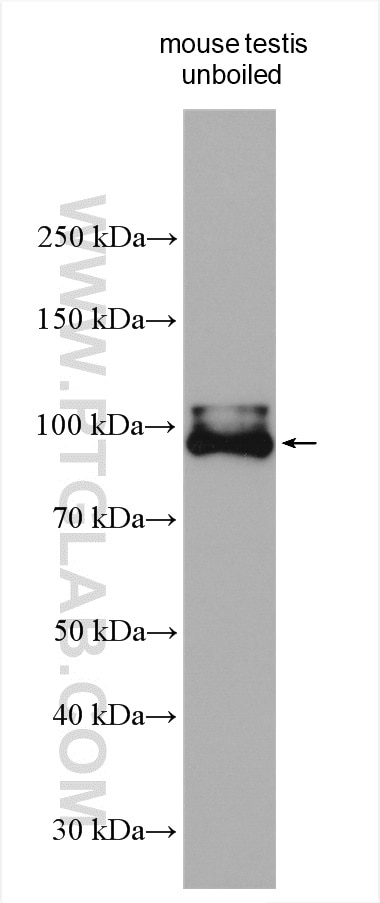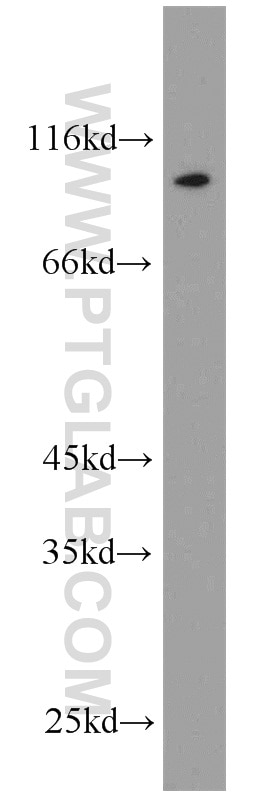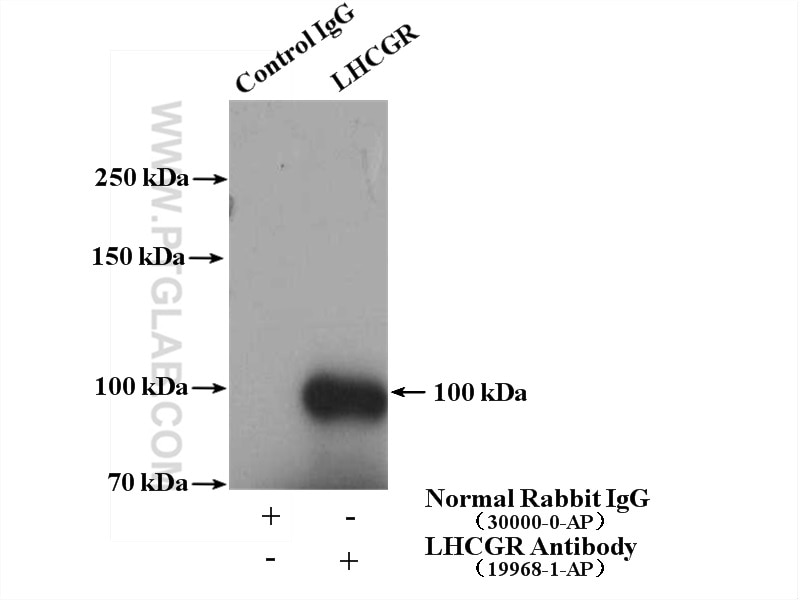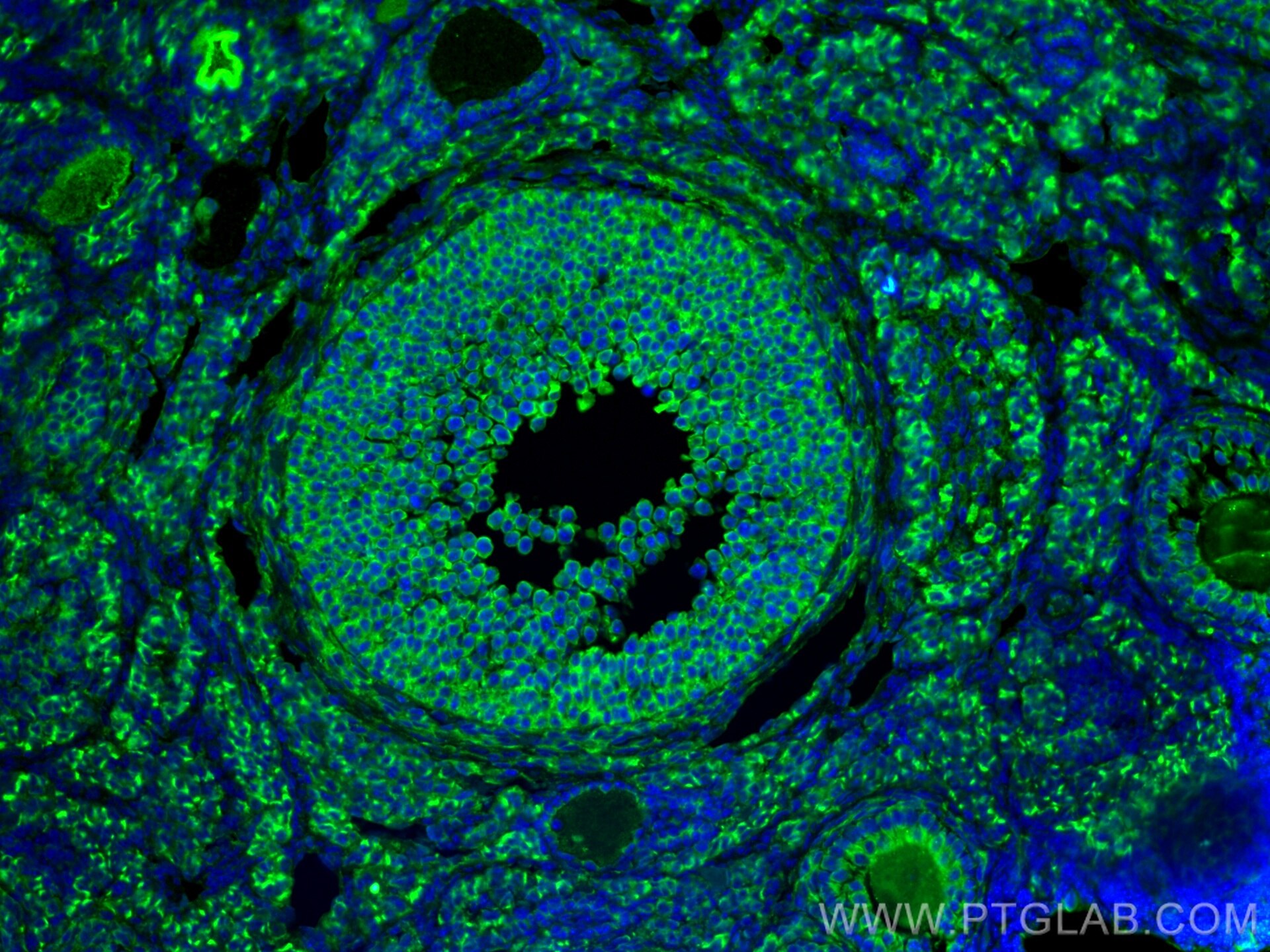Validation Data Gallery
Tested Applications
| Positive WB detected in | unboiled mouse testis tissue, mouse ovary tissue |
| Positive IP detected in | mouse testis tissue |
| Positive IF-P detected in | mouse ovary tissue |
Recommended dilution
| Application | Dilution |
|---|---|
| Western Blot (WB) | WB : 1:500-1:3000 |
| Immunoprecipitation (IP) | IP : 0.5-4.0 ug for 1.0-3.0 mg of total protein lysate |
| Immunofluorescence (IF)-P | IF-P : 1:50-1:500 |
| It is recommended that this reagent should be titrated in each testing system to obtain optimal results. | |
| Sample-dependent, Check data in validation data gallery. | |
Published Applications
| KD/KO | See 2 publications below |
| WB | See 33 publications below |
| IHC | See 5 publications below |
| IF | See 1 publications below |
Product Information
19968-1-AP targets LHCGR in WB, IHC, IF-P, IP, ELISA applications and shows reactivity with human, mouse, rat samples.
| Tested Reactivity | human, mouse, rat |
| Cited Reactivity | human, mouse, rat, pig, sheep |
| Host / Isotype | Rabbit / IgG |
| Class | Polyclonal |
| Type | Antibody |
| Immunogen |
Peptide 相同性解析による交差性が予測される生物種 |
| Full Name | LHCGR |
| Calculated molecular weight | 79 kDa |
| Observed molecular weight | 90-100 kDa |
| GenBank accession number | NM_000233 |
| Gene Symbol | LHCGR |
| Gene ID (NCBI) | 3973 |
| RRID | AB_10697685 |
| Conjugate | Unconjugated |
| Form | |
| Form | Liquid |
| Purification Method | Antigen affinity purification |
| UNIPROT ID | P22888 |
| Storage Buffer | PBS with 0.02% sodium azide and 50% glycerol{{ptg:BufferTemp}}7.3 |
| Storage Conditions | Store at -20°C. Stable for one year after shipment. Aliquoting is unnecessary for -20oC storage. |
Background Information
Lutropin-choriogonadotropic hormone receptor (LHCGR, also known as LHR or LSHR) belongs to the rhodopsin-like family of G protein-coupled receptors (GPCRs). It plays a crucial role in the regulation of gonadal functions by stimulating steroidogenesis in response to luteinizing hormone (LH) or hCG (PMID: 15866423). Mutations in the LHCGR gene result in familial male-limited precocious puberty, Leydig cell hypoplasia, and empty follicle syndrome (PMID: 30711030). LHCGR protein consists of 699 amino acids with a calculated molecular weight of 79 kDa. Due to massive glycosylation, the molecular mass of the mature LHCGR is higher (85-100 kDa) than the predicted molecular protein mass of 79 kDa (PMID: 23686864; 15866423; 29075189; 15969756).
Protocols
| Product Specific Protocols | |
|---|---|
| IF protocol for LHCGR antibody 19968-1-AP | Download protocol |
| IP protocol for LHCGR antibody 19968-1-AP | Download protocol |
| WB protocol for LHCGR antibody 19968-1-AP | Download protocol |
| Standard Protocols | |
|---|---|
| Click here to view our Standard Protocols |
Publications
| Species | Application | Title |
|---|---|---|
J Hazard Mater GRP78/IRE1 and cGAS/STING pathway crosstalk through CHOP facilitates iodoacetic acid-mediated testosterone decline | ||
Environ Pollut Chronic exposure to polystyrene microplastics induced LHR reduction and decreased testosterone levels through NF-κB pathway | ||
Part Fibre Toxicol Chronic exposure to polystyrene microplastics induced male reproductive toxicity and decreased testosterone levels via the LH-mediated LHR/cAMP/PKA/StAR pathway. | ||
Int J Nanomedicine La2O3 Nanoparticles Induce Reproductive Toxicity Mediated by the Nrf-2/ARE Signaling Pathway in Kunming Mice. | ||
Biol Res Unraveling the impact of hyperleptinemia on female reproduction: insights from transgenic pig model | ||
Reprod Biol Endocrinol miR-6881-3p contributes to diminished ovarian reserve by regulating granulosa cell apoptosis by targeting SMAD4 |




